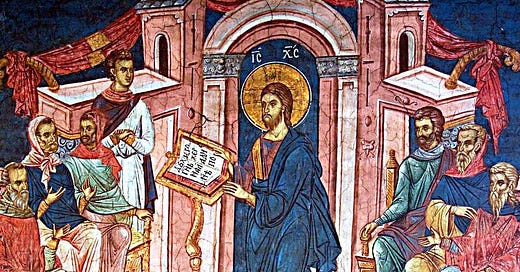A homily for the Third Sunday in Ordinary Time, Cycle C.
And the people wept.
That's what the scripture tells us in the first reading today.
The Jews had been in exile for 50 years before they finally came home, and the priest Ezra read them the books of the law, the first books of the Bible. And when they heard those words--the words of God--they wept.
They wept at the memory of all they had suffered, all those they'd lost, all of their struggles.
And they wept with joy to hear of God's promise. His mercy. His love.
The people fall to the ground and worship because God is present in his scripture. And Ezra tells the people, Do not be sad. Do not weep. Go your way, eat good food and drink good wine, and if someone doesn't have food or wine, give them some, because this day is holy to the LORD. Do not be sad, for rejoicing in the Lord must be your strength.
Five hundred years later, the people are still gathering to hear the word of God. But this time, in a small backwater town called Nazareth, the word is not read by any ordinary prophet or priest. It is read by its author. By the Word himself.
Jesus has come home, in the power of the spirit, to preach. This is the town where Jesus grew up--the synagogue where he studied scripture.
Like Ezra, Jesus also opens a scroll. He reads a passage from Isaiah. Everyone would have known it. Like the passage Ezra read, it talks about a Jubilee year. This happened once every 50 years. Slaves were set free, property was returned to its original owners, and fields were left unplanted. It was a year of rest and the forgiveness of debts.
Jesus came to bring that forgiveness to everyone. And right over there, in those confessionals, it's still available to us. Our sins wiped away by the action of Christ through his anointed priests. The slaves set free? That's you and me, any time we let Jesus set us free from our sins and our worries and our burdens.
As for the erasing of all debts, I know a lot of us would like to see that, but that's not here yet. So we celebrate, and rest, and enjoy the fruits of our labor.
Now, it happens that we are in a Jubilee year. The church has them every every 25 years, and the last was in 2000. The theme of this year is “Hope does not disappoint." We will be talking about the Jubilee throughout the year, but that theme is the thing that we need to hold onto in a particular way, because a lot of us have lost hope. I understand it. There are times when I despair for our world as well, but despair is a sin, because when we despair we don't trust God. And what is the sign that we trust God?
Hope.
That's what Jesus is calling us to today. We are the poor he is talking about. We are the captive. We are the blind. We are the oppressed.
No matter how far we've come in our faith, whether we're starting out on our journey like my friends in OCIA who will be joining the church this easter, or whether we have lived in the faith all our lives.
I've been poor. Materially poor, but also spiritually poor. Poor in faith. Poor in virtue. Poor in so many things.
I've been captive. Captive to sin. Captive to the world.
I've been blind. Blind to the wonder of God all around me. Blind to the needs of others.
I've been oppressed. Oppressed by the devil. Oppressed by sin.
And that's just me.
All of us can look at our lives, and see how Christ begins his ministry by talking directly to us.
Maybe we are materially poor right now. So many have lost their jobs, and are struggling with inflation to simply feed their families. But people are also poor when they don't have the scripture, or faith, or Jesus, or the eucharist. You can't be more poor than that.
Around the world, countless Christians are held captive, persecuted, and even killed. In this country, just this week, the president had to pardon almost two dozen pro-life activists who were serving prison terms for protesting in abortion clinics.
And many are blind and deaf to the glory of God that—a glory that ceaselessly calls them here, to this table.
So poverty, captivity, blindness, oppression--they have many forms. Spiritual. Material. Personal.
In reading this passage from Isaiah, Jesus is telling the people that the time of the messiah is here, now, fulfilled in him. The word that Ezra read to the people, now walks among them. Jesus offers us freedom for all those things that bind us or blind us or hold us back. Total freedom and complete forgiveness.
How can this happen to me? I think of all that I have done, of all my sins, and all the brokenness of the world, and I'm amazed that the good news has come to me, and to my time. But it has. Because God's blessing has come among us. It's available to us right here, right now.
And so today we can hear his words, and offer him a prayer: Lord Jesus you give us a choice to accept your peace and lay down our burdens, or to continue in our own fallen ways. Help us, please, to make the right choice.
Amen.





Thank you for this post: for the reminder of Jesus’ reading Isaiah re setting the captives free to apply to our spiritual and personal lives as well as to the material. God bless you and have a great week.🙏🏼🙏🏼🙏🏼